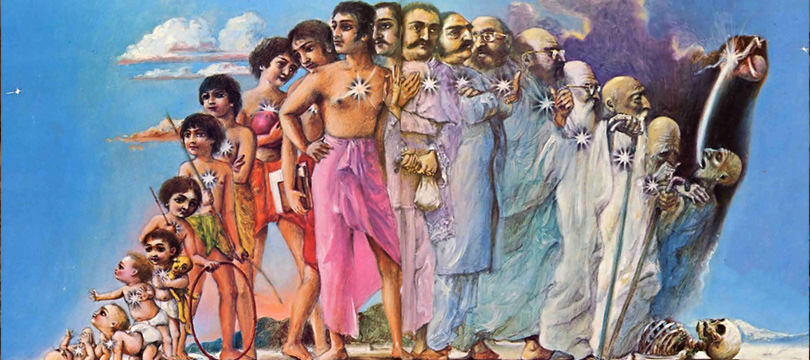It's not possible to give a date when the concept of reincarnation first appeared among human beliefs because it seems to be as old as humankind itself and it is present in cultures all over the world.Its first manifestation seems to be in Shamanism. From it the belief in rebirth has passed into all major religions that have developed on earth, accompanying and influencing them throughout their evolution.
Reincarnation though transcends the limits of specific, codified religious systems. Nowadays, in a more and more secularised Western society, it is science that enjoys respect and credibility, while traditional religions are constantly losing public interest: in fact people are in search direct and less structured spirituality. In this climate, interest in reincarnation is not fading but growing and this ancient, primordial belief is now receiving validation and support by just those very scientific milieux that - traditionally - have always been the antagonists of religions. I say ‘primordial belief’ because looking back to the entire history of human thought, reincarnation is actually the only worldwide concept that has shown continuity and permanence from our origins to the present day.Eastern religions are well known to hold the concept of rebirth at the very core of their teachings. What is less known is that reincarnation has also always been present in monotheistic faiths and philosophical systems of Western and Middle Eastern societies.
In classical Greece Plato, Diogenes and Pythagoras spoke of reincarnation and past life regressions.
The Ancient Jews believed that Abel had reincarnated into Moses, and in the Middle Ages reincarnation appears in the esoteric teaching of Kabbalah, developed further in later times by the Hassidic movement.
The concept of Karma was introduced to Latin Rome by Ennius, after being imported from the newly conquered Eastern territories, specially India, and Virgil describes reincarnation in his poems. Medieval Islam was also familiar with the concept of rebirth, and the Persian Sufis have preserved this belief up to the present day. The Quran itself explains the law of Karma. What about Christianity? Reincarnation was an integral part of the beliefs of early Christians and there are references to it even in the teachings of Jesus himself. Reincarnation states that we incarnate over and over again, experiencing all sorts of human conditions, and that someone who had been a king in the past could be reborn as a tramp and vice versa.
The idea of rebirth has never been extirpated and today - although the traditional religious systems are in crisis throughout the entire Western civilisation - the belief in reincarnation is growing steadily both in Europe and the USA, as the statistics of the last twenty years show.
From various polls it appears that 25% of Americans believe in reincarnation, which means that one American in four believes in past lives. The European average is only slightly lower (24%) but it greatly varies from country to country, going from 15% in Norway to 33% in Great Britain. This means that in the UK one person out of three believes they have already lived in another body, in another time and - consequently - will probably come back again in the future.
Fully embracing the concept of reincarnation and living according to it will generate at least two important benefits which we are certainly in great need of: a serious environmental conscience and tolerance.
Reincarnation & Karma
If we believe that when we die it’s all over or - alternatively - that we fly away to heaven leaving the earth far behind us forever, there is not much incentive to protect the environment for future generations that we shall never meet. The temptation to say: “It will be their problem, who cares?” is strong. However if we believe that we shall come back here and that we shall be part of those future generations, then the problem suddenly becomes ours too and it’s better to look into it sooner rather than later (especially because it is already quite late anyway).
Reincarnation teaches that we have all lived many, many lives, incarnating in many different conditions: different sex, different colour of skin, different cultures, different religions, different sexual orientation, different locations, different social status ... Once we are fully aware of this, it becomes impossible to attack someone else for being “different from us” because we know that we have experienced all the possible permutations ourselves. Reincarnation teaches tolerance, it teaches us to accept and respect what is different from us because we are likely to have already been - or are going to be - in that way too.
A quick search on Google gives 5,200,000 hits for ‘Reincarnation’ and 59,100,000 hits for “Past Lives”. These data speak for themselves and don’t need any further comment.
To end this part we need only to add a few words on the concept of Karma, which is the universal law that regulates Reincarnation. Karma means “action”, “deed”, but it can also mean “reaction”. Although its precise interpretation varies from religion to religion, Karma can be broadly defined as the universal law that regulates the cycles of rebirth through actions that will need reactions until the balance goes back to zero.
These facts are quite well-known and probably do not need to be discussed any further here. However I would like to briefly look into an interpretation which is unfortunately too commonly heard in modern Western civilisation. According to it the evil that people suffer depends on previous faults of theirs.
This is a very reductive and simplistic way to explain this universal law and it also lacks compassion. Although Karma is the law of cause and effect, action and reaction, it is not so simple and easy. Before reincarnating, the soul decides a broad script for its new life, setting some goals to achieve through certain types of experiences. We all do this but the choice of whether to have happy or painful experiences is not simply dictated by a sort of spiritual accountant who has to balance the books at the end of the day.
It’s true that a painful experience can be in payment for an old debt, but many other reasons can also explain it: some souls may decide to speed up their evolution by filling a single life with tests that other souls prefer to undergo during many lives. There is always someone who takes a shortcut and in this case we should admire them and not tell them that they deserve their suffering because they are guilty.
Not only that: learning compassion and expressing it is the best way to progress in the spiritual world and it should therefore always be paramount. Compassion helps the sufferer who receives it, but even more the person who shows it. If you see a blind man walking unknowingly under a train you can think that it’s his karma to die in that way and maybe that a premature death is the fair reward for some bad deed he committed in another life. Or you can go and save him, preventing him from dying, because if you don’t take action you might find yourself, in a future life, paying for your callousness, so that when you will be most in need of help no-one will give it to you. Life plans are always complex things that involve many souls; there are mutual agreements of interactions.
Any hasty and superficial judgement of the painful tests someone else is passing through needs to be carefully avoided. So - if you see someone suffering some terrible ordeal - don’t think that they deserve it, but instead think: “How courageous they must be to have chosen to go through such a terrible experience” and give them all the support you can.
Remember: there is always an alternative in life.
- joylivhealing@gmail.com
- +91-7042204544




 - Vandna Garg
- Vandna Garg


